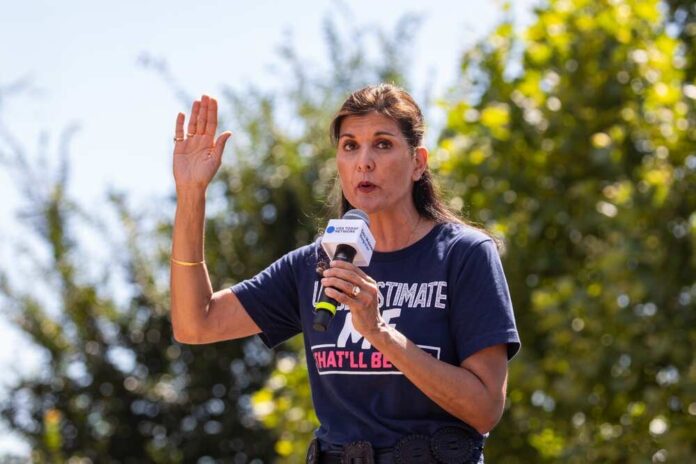
At the first GOP presidential debate held Wednesday evening, the clash between former South Carolina Gov. Nikki Haley and entrepreneur Vivek Ramaswamy created a clear ideological divide on foreign policy within the Republican party. Both candidates laid out directly contrasting viewpoints that epitomize the current struggle within conservative circles on America’s role in the world.
Haley, with her solid foreign policy background, chastised Ramaswamy for his stance on Ukraine. “If Russia, once Russia should take Ukraine, Poland and the Baltics are next. That’s a world war! We’re trying to prevent war,” she asserted. She framed her position as one in line with the necessity of American leadership in global affairs, arguing that Ukraine’s plight could escalate into a situation that ultimately affects U.S. interests and security. A former U.S. ambassador to the United Nations, Haley reflects the neoconservative wing that champions a robust American role internationally.
Moment of the night:
Vivek Ramaswamy triggers the entire GOP stage by calling them out for being “bought and paid for.”
🔥🔥🔥
“I'm the only person on the stage who isn't bought and paid for. So I can say this, the climate change agenda is a hoax. The climate change agenda is… pic.twitter.com/hhdGL1zsq1
— Collin Rugg (@CollinRugg) August 24, 2023
Ramaswamy, the self-described “only person on the stage who isn’t bought and paid for,” countered with sharp retorts aimed at the political establishment. “First of all, Nikki, I wish you well on your future career on the boards of Lockheed and Raytheon,” he quipped. Though lacking in foreign policy experience, Ramaswamy represents the rising “America First” segment of the GOP. His reluctance to support Ukraine reflects a pragmatic view, arguing that such an approach would push Russia closer to China and that America should instead focus on securing its own borders.
If Nikki Haley would ever stop to listen, this is @VivekGRamaswamy's plan on Israel: take our friendship to the next level, from a client relationship to a true friendship. The centerpiece of Vivek’s Middle East policy in Year 1 will be to consummate “Abraham Accords 2.0” which… pic.twitter.com/aheHQvar0m
— Team Vivek War Room (Text VIVEK to 84835) (@VivekWarRoom) August 24, 2023
While Haley and other establishment figures like former New Jersey Gov. Chris Christie criticized Ramaswamy’s lack of experience, his positions resonate with many GOP voters weary of endless foreign entanglements. “Now is not the time for on-the-job training,” warned former Vice President Mike Pence, but the new voice Ramaswamy brings to the table argues otherwise. His grassroots popularity — mirrored in his rise in recent polls — shows a thirst for an alternative to business-as-usual Washington establishment politics.
Haley’s assertive posture against Russia also drew applause, underlining that a significant part of the Republican base still values strong international leadership. “You are choosing a murderer over a pro-American country,” she told Ramaswamy, emphasizing the moral dimensions of foreign policy choices.
Ramaswamy’s rise and challenge to establishment candidates signify the ideological tugs-of-war within the GOP. His focus on domestic issues and skepticism of foreign aid mirrors a broader shift within sections of the party towards prioritizing problems that directly affect Americans.
Quite the photo pic.twitter.com/lzaFcHWmDQ
— Nick Field (@nick_field90) August 24, 2023
The divide between Haley and Ramaswamy reflects the broader GOP struggle to define its stance on American internationalism. As primary voters look ahead, they face a choice between a seasoned politician who advocates for a robust American presence globally and a newcomer who asks why America should be the world’s police force when there are problems to solve at home.
In a year where the GOP seeks to unify its base, the Haley-Ramaswamy showdown could serve as a litmus test for the party’s future on foreign policy. With divergent viewpoints so starkly outlined, Republican primary voters have their work cut out for them.














